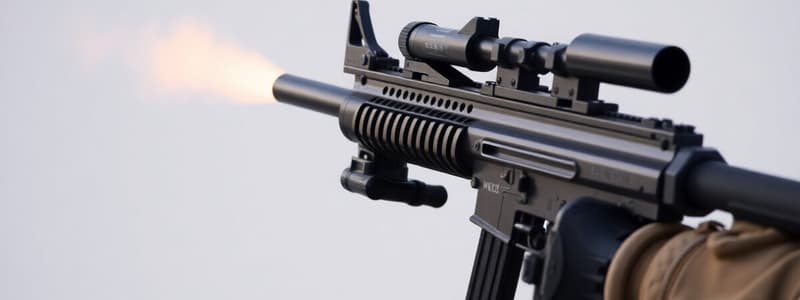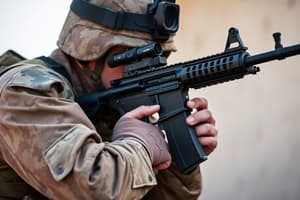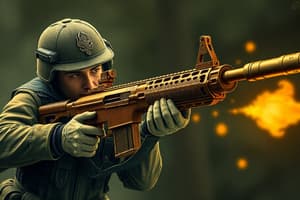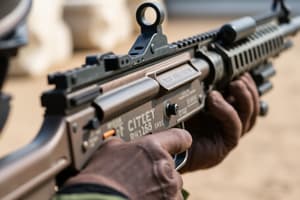Podcast
Questions and Answers
A unit is tasked with preventing enemy reinforcements from reaching a critical point. Which type of fire support is MOST appropriate for this mission?
A unit is tasked with preventing enemy reinforcements from reaching a critical point. Which type of fire support is MOST appropriate for this mission?
- Fires in support of the assault
- Fires in support of consolidation
- Long range fires (correct)
- Close defensive fires
A gunner is engaging a moving enemy vehicle that is rapidly changing direction but maintaining a consistent distance. Which type of fire is MOST suitable?
A gunner is engaging a moving enemy vehicle that is rapidly changing direction but maintaining a consistent distance. Which type of fire is MOST suitable?
- Grazing fire
- Swinging traverse (correct)
- Enfilade fire
- Fixed fire
A machine gun is positioned such that its cone of fire remains within one meter of the ground. What is this an example of?
A machine gun is positioned such that its cone of fire remains within one meter of the ground. What is this an example of?
- Enfilade fire
- Flanking fire
- Grazing fire (correct)
- Fixed fire
During an assault, supporting fire is delivered to neutralize the most immediate threat to the advancing unit. What BEST describes this type of fire?
During an assault, supporting fire is delivered to neutralize the most immediate threat to the advancing unit. What BEST describes this type of fire?
Given the effective ranges, which weapon system is MOST suitable for engaging an area target at a range of 2000 meters?
Given the effective ranges, which weapon system is MOST suitable for engaging an area target at a range of 2000 meters?
According to machine gun employment principles, which factor directly influences the decision to maximize fire effectiveness while conserving ammunition?
According to machine gun employment principles, which factor directly influences the decision to maximize fire effectiveness while conserving ammunition?
In the context of machine gun displacement, what is a key consideration for an SBF (Support By Fire) position that would necessitate a change in location?
In the context of machine gun displacement, what is a key consideration for an SBF (Support By Fire) position that would necessitate a change in location?
When assigning machine gun missions in a defensive scenario, which combination of missions capitalizes on both long-range observation and close-in protection?
When assigning machine gun missions in a defensive scenario, which combination of missions capitalizes on both long-range observation and close-in protection?
Using the M2A1 machine gun firing in a rapid rate, how often should the barrel be changed?
Using the M2A1 machine gun firing in a rapid rate, how often should the barrel be changed?
Under what circumstances could a unit displacement be preferred over an echelon displacement?
Under what circumstances could a unit displacement be preferred over an echelon displacement?
What is the significance of understanding the 'Cone of Fire' characteristic in machine gunnery?
What is the significance of understanding the 'Cone of Fire' characteristic in machine gunnery?
In the acronym ADDRAC, what specific element allows for battlefield synchronization and prevents multiple elements from engaging the same target?
In the acronym ADDRAC, what specific element allows for battlefield synchronization and prevents multiple elements from engaging the same target?
What is the approximate cyclic rate of fire for the MK19?
What is the approximate cyclic rate of fire for the MK19?
Flashcards
Swinging Traverse Fire
Swinging Traverse Fire
Fire that requires major changes in direction but not elevation to suppress a target
Fixed Fire
Fixed Fire
Fire used on a stationary target that requires little to no manipulation
Flanking Fire
Flanking Fire
Fire delivered against the side or rear of an enemy formation
Enfilade Fire
Enfilade Fire
Signup and view all the flashcards
Grazing Fire
Grazing Fire
Signup and view all the flashcards
SBF Displacement Criteria
SBF Displacement Criteria
Signup and view all the flashcards
Economy of Rounds
Economy of Rounds
Signup and view all the flashcards
ADDRAC Meaning
ADDRAC Meaning
Signup and view all the flashcards
MORT Meaning
MORT Meaning
Signup and view all the flashcards
Displacement Methods
Displacement Methods
Signup and view all the flashcards
Preferred Offensive Employment
Preferred Offensive Employment
Signup and view all the flashcards
MG Defense Missions
MG Defense Missions
Signup and view all the flashcards
Classes of Fire (Gun)
Classes of Fire (Gun)
Signup and view all the flashcards
Study Notes
- Displacement of a Support By Fire (SBF) position may be required if supporting fires are masked by the supporting unit.
- The MG employment principle addressing ammo consumption and maximizing fire effectiveness is economy of rounds.
- ADDRAC stands for Alert, Direction, Description, Range, Assignment, Control.
- MORT stands for Method, Objective, Route, Time.
- Methods of displacement include Echelon and Unit.
- The preferred method of employment in the offense is by section.
- Two missions assignable to a Machine Gun in the defense are PRF and FPL.
- Characteristics of fire include burst of fire, trajectory, cone of fire, beaten zone, dead space, and danger space.
M240 Rates of Fire
- Sustained rate: 100 RPM, 6-8 round bursts, pause of 4-5 seconds, barrel change every 10 minutes
- Rapid rate: 200 RPM, 6-8 round bursts, pause of 2-3 seconds, barrel change every 2 minutes
- Cyclic rate: 550-650 RPM, barrel change every 1 minute
M2A1 Rates of Fire
- Sustained rate: 40 or fewer RPM, 6-9 round bursts, pause of 10-15 seconds, barrel change at the end of the day
- Rapid rate: More than 40 RPM, 6-9 round bursts, pause of 5-10 seconds, barrel change every hour
- Cyclic rate: 450-600 RPM, barrel change every 30 minutes
MK19 Rates of Fire
- Sustained rate: 40 RPM, 6-9 round bursts, pause of 10-15 seconds
- Rapid rate: 60 RPM, 6-9 round bursts, pause of 8-10 seconds
- Cyclic rate: 325-375 RPM
Classes of Fire
- With respect to ground: Grazing and Plunging
- With respect to target: Frontal, Flanking, Oblique, Enfilade
- With respect to gun: Fixed, Traversing, Searching, Searching & Traversing, Swinging Traverse, Free Gun
- The prescribed distance for MSL's is 15 degrees.
- When conducting overhead fire on undulating/un-level terrain, the methods to establish an OSL is Gunner Leader Rule.
Weapon Max Ranges
- M240 Point: 800m
- M240 Area: 1800m
- M240 Max Effective: 1800m
- M2A1 Point: 1500m
- M2A1 Area: 1830m
- M2A1 Max Effective: 1830m
- MK19 Point: 1500m
- MK19 Area: 2212m
- MK19 Max Effective: 2212m
- Swinging traverse fire is used to suppress a target that requires major changes in direction but not elevation.
- Fixed fire is used on a point target that requires little to no manipulation.
- Flanking fire is delivered against the flank of a target, or at the side or rear of an enemy formation
- Enfilade fire is where the long axis of the beaten zone coincides or nearly coincides with he long axis of the target.
- Grazing fire happens When the center of the cone of fire doesn't rise more than 1 meter above the ground
- Fires in support of maneuver are beyond maneuver.
- Fires in support of isolation target maneuver units' immediate objective during the assault
- Fires in support of consolidation happen when units are most vulnerable to enemy counterattack. Fires in support of the assault are delivered against the most immediate & serious threat to it.
- Long range fires interdict and disrupt the enemy before they become a threat
- Fires identified as FPL that can only be fired when authorized by the unit commander are FPF.
- Close defensive fires address the immediate threat to the units defense, primary EA.
Studying That Suits You
Use AI to generate personalized quizzes and flashcards to suit your learning preferences.




